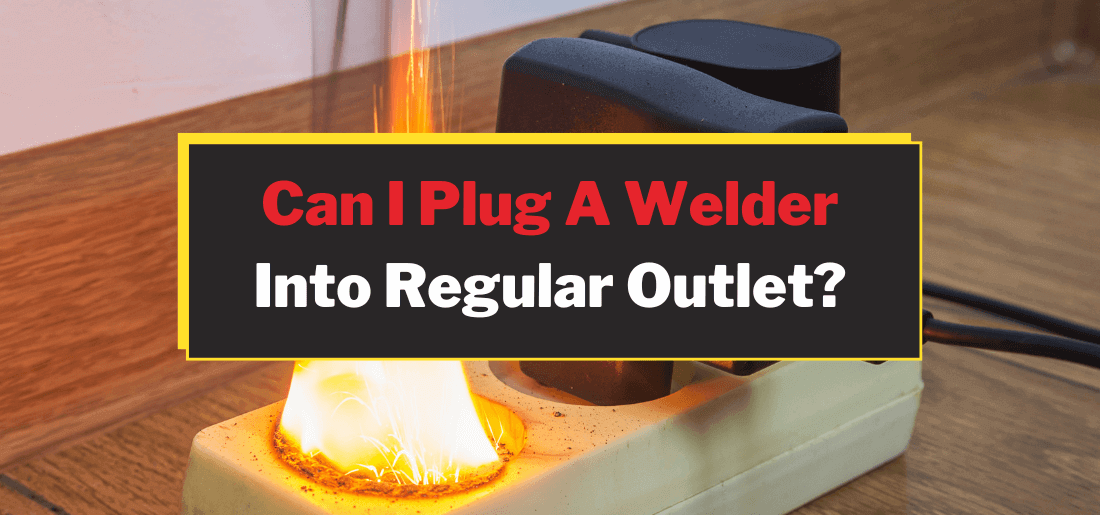Welders are an essential piece of equipment for many DIY and professional projects. Can I plug a welder into a regular outlet?
The answer, as it turns out, is yes. You can plug a welder into a regular outlet. However, there are some things you need to know before you do so.
In this blog post, we’ll be discussing the differences between welding outlets and regular outlets and we’ll also be outlining some safety tips for using welders. So if you’re wondering whether or not you can plug your welder into your regular outlet, stay tuned we’ve got all the answers for you!
Can welders be plugged into regular outlets?
The answer is yes, welders can be plugged into regular outlets. However, there are some important things you need to know before that.
Differences between welding outlets and regular outlets
Welding outlets are designed to handle the high amperage that is required for welding, whereas regular outlets are not. This means that if you’re going to be plugging your welder into a regular outlet, you need to be aware of the fact that the outlet will not be able to handle the same amount of power as a welding outlet.
This also means that you need to be extra careful when using a welder with a regular outlet.
Some safety tips for using welders with regular outlets include:
- Only use welders with cords that are rated for the amperage of the welder.
- Do not use extension cords with welders.
- Make sure that the area around the welder is clear of flammable materials.
- Do not leave the welder unattended while it is plugged in.
- Be sure to unplug the welder when you’re finished using it.
As long as you follow these safety tips, you should be able to use your welder with a regular outlet without any problems. Just be aware of the fact that the outlet will not be able to handle as much power as a welding outlet, and take precautions accordingly.
One of the most important things to know about welding is that it requires a lot of power. Most welders require between 110 and 220 volts of power to operate properly. This means that attempting to plug a welder into a regular outlet, which typically only provides around 110 volts of power – is a recipe for disaster.
Not only will the welder not work properly, but it could also damage the outlet, the cord, or the welder itself.
So what’s the solution?
If you want to use a welder with a regular outlet, you’ll need to invest in a welding outlet adapter. These adapters allow you to safely and effectively convert the power from your regular outlet into the power that your welder needs to operate. Once you have one of these adapters, simply plug it into your outlet and then plug your welder into the adapter.
While using an adapter is technically safe, there are still some safety hazards to be aware of.
- First, make sure that the adapter is rated for the same voltage as your welder. Using an adapter with a higher voltage rating than your welder could damage the machine.
- Second, be sure to read all of the instructions that come with your adapter. These instructions will outline how to properly use and care for the adapter, and following them will help to ensure your safety.
In general, using a welder with a regular outlet is safe as long as you take the proper precautions. Be sure to invest in a welding outlet adapter and follow all of the manufacturer’s instructions carefully. By doing so, you can avoid any damage to your welder, outlet, or cord and you can get back to work on your projects!
Are there any dangers associated with using a welder in home outlet?
Two most important dangers keep in mind while using a welder into regular outlet.
- Overheat and Catch Fire: One of the biggest dangers of using a welder in your home outlet is the potential for starting a fire. This is because welders require a lot of power to operate, and regular outlets are not designed to handle this amount of power. If you try to plug a welder into a regular outlet, the outlet could overheat and catch fire.
- Damage Welder Machine: Another danger of using a welder in your home outlet is the potential for damaging your welder. This is because most home outlets only provide around 110 volts of power, while most welders require between 110 and 220 volts to operate properly. If you try to use a welder with an insufficient power source, you could damage the machine.
FAQs Regarding Plug Welder Into Regular Outlet
What outlet do I need for a welder?
If you plan on doing any serious welding, you’re going to need a 220-volt outlet. This will allow you to use all of the features and functions that your welder is capable of. If you don’t have a 220-volt outlet available, you can still use a 110-volt outlet, but you’ll be limited in terms of what you can do.
Can you weld on a 110 outlet?
Yes, it is possible to weld on a 110 outlet, but it is not recommended. 110 outlets are not designed to handle the high amount of power that welding requires, and as such, they can be easily damaged.
Additionally, welding on a 110 outlet can pose a serious fire hazard. If you must weld on a 110 outlet, be sure to take all necessary safety precautions, and always have a fire extinguisher on hand in case of an emergency.
How many amps are recommended for 110 welders?
Most 110 welders require between 20 and 30 amps of power to operate properly. This means that you will need an outlet that can provide this amount of power in order to make your work go professionally.
Why does my welder keep tripping the breaker?
One of the most common reasons that a welder keeps tripping the breaker is because the welder is not getting enough power. This can happen if the outlet you are using does not provide enough power or if the welder cord is not rated for the amperage of the welder.
Another reason that a welder may keep tripping the breaker is that the area around the welder is not well ventilated. This can cause the welder to overheat and trip the breaker.
Can you run a welder off an extension cord?
The short answer is: no, you cannot run a welder off an extension cord. The Long answer is: it depends on the welder, the extension cord, and the power source. A welder needs a dedicated circuit with the proper amperage to run.
An extension cord can not provide the proper amperage for a welder. If you have a welder that is designed to run off an extension cord, the cord must be heavy duty and rated for the amperage of the welder. The power source must also be able to provide the proper amperage for the welder.
Wrap Up
So, can you plug a welder into a regular outlet? The answer is yes, but it’s not recommended. Welders use a lot of power and if plugged into a standard outlet, they could overload the circuit and cause a fire. It’s best to use a heavy-duty extension cord specifically designed for welders when connecting your welder to an outlet.
Make sure the cord is in good condition and has no damage that could create an electrical hazard. When using any type of welding equipment, always take precautions to stay safe.
Follow the manufacturer’s instructions and be aware of your surroundings so you don’t start any fires.
Welders use a lot of electricity, so it’s important to make sure you have the right kind of outlet for your welder. A regular household outlet won’t work, you’ll need a special welding outlet. If you’re not sure whether or not your outlet is compatible with your welder, ask a professional electrician.




